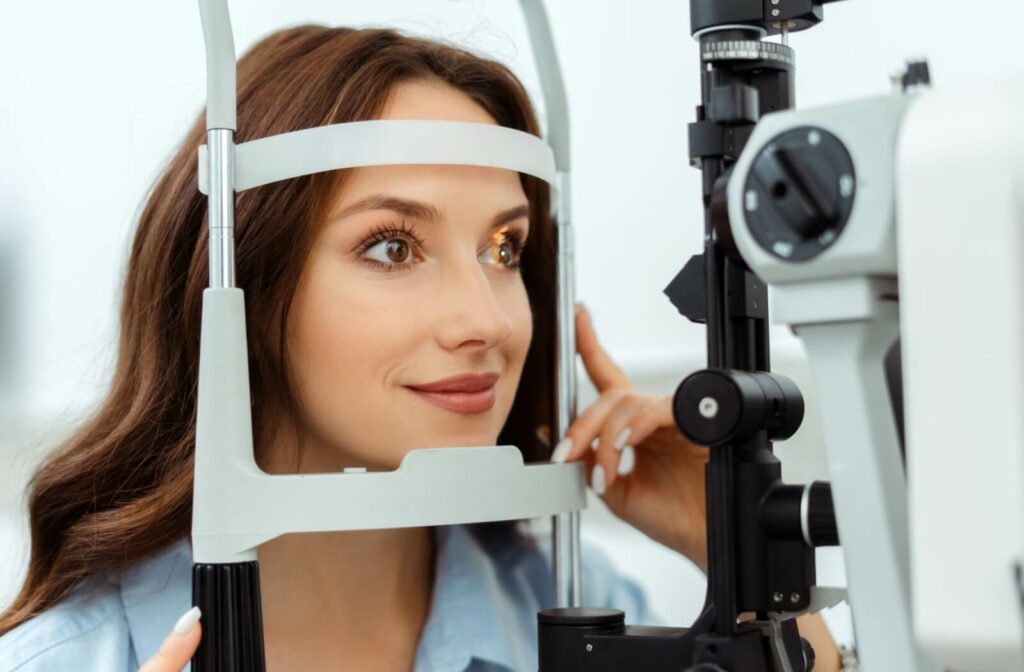When people think of eye exams, they typically see them as a means to assess vision clarity and update prescriptions for eyewear like glasses or contact lenses. However, a thorough eye exam can uncover much more than just vision issues; it can also identify a range of serious health conditions that might otherwise go unnoticed, including:
- Glaucoma
- Diabetes and diabetic retinopathy
- Age-related Macular Degeneration (AMD)
- Hypertension
- Multiple sclerosis
- Thyroid disease
- Cardiovascular disease
- Autoimmune disorders
Eye health is intricately linked to overall health, making routine eye exams essential not only for keeping your vision sharp, but also for the early detection and management of various health issues. By conducting eye exams, specialists can identify a range of eye conditions and other diseases, providing a window into your overall wellness.
Glaucoma
Glaucoma encompasses a group of conditions that damage the optic nerve, often due to elevated eye pressure. Glaucoma is a leading cause of blindness in individuals over 60.
Detection
Eye specialists use a tonometer to measure eye pressure during exams. They may also examine the optic nerve by dilating the pupils and using imaging tests like optical coherence tomography (OCT).
Diabetic Retinopathy
Diabetic Retinopathy arises when high blood sugar levels damage the retinal blood vessels, potentially leading to blindness if untreated.
Detection
Eye exams can detect early signs of diabetic retinopathy through retinal imaging or fundoscopy, allowing doctors to observe changes in the blood vessels or other retinal abnormalities.
Age-Related Macular Degeneration (AMD)
AMD affects the macula, which is responsible for central vision, causing it to weaken while peripheral vision remains unaffected. AMD is a major cause of vision loss in older adults.
Detection
Doctors examine the retina for AMD signs and may use an Amsler grid test for visual distortions or OCT to assess retinal layers.
Hypertension
High blood pressure can result in hypertensive retinopathy, damaging the retinal blood vessels.
Detection
Indications of this condition include narrowed blood vessels, retinal spots, and optic nerve swelling, all of which are identifiable during a retinal exam.
Multiple Sclerosis (MS)
MS is a central nervous system disorder where the immune system mistakenly attacks the protective myelin around nerve fibers.
Detection
Optic neuritis, or optic nerve inflammation, often signals MS. Eye exams can reveal symptoms like blurred or double vision, color distortion, and pain with eye movement.

Thyroid Conditions
Thyroid disorders, such as Graves’ disease, can impact your eyes, leading to issues like thyroid eye disease (TED) or protruding eyes (exophthalmos).
Detection
During a routine eye exam, symptoms like eye protrusion, swelling, and redness can be observed.
Cardiovascular Conditions
Cardiovascular diseases, which involve the heart and blood vessels, can cause serious problems like heart attacks and strokes.
Detection
Indicators such as blockages in retinal arteries or changes in retinal blood vessels can signal cardiovascular issues, which can be detected during a comprehensive eye examination.
Autoimmune Conditions
Autoimmune diseases occur when the immune system mistakenly attacks the body’s own tissues. Examples include lupus and rheumatoid arthritis.
Detection
Signs such as uveitis (inflammation of the uvea) or dry eye syndrome may suggest autoimmune disorders and can be identified during an eye exam.
The Role of Eye Exams
Eye exams play a crucial role in maintaining overall health and well-being. They aren’t just about checking vision clarity or updating prescriptions for glasses and contact lenses. Here’s why eye exams are important:
- Early Detection of Eye Conditions: Eye exams can identify early signs of eye diseases such as glaucoma, cataracts, and macular degeneration, which can prevent vision loss if treated promptly.
- Detection of Systemic Health Issues: Many systemic health conditions, like diabetes, hypertension, and autoimmune disorders, can manifest symptoms in the eyes. Regular eye exams can help detect these issues early, allowing for timely intervention.
- Vision Correction: Regular exams make sure that any changes in vision are addressed, helping to maintain optimal vision and comfort with the correct prescription lenses.
- Preventive Health Care: By identifying potential health issues early, eye exams contribute to preventive health care, reducing the risk of severe complications and improving overall health outcomes.
- Comprehensive Health Assessment: Eye exams provide a comprehensive assessment of your ocular health, offering insights into your general health and helping to guide further medical evaluations if necessary.
How Often Should You Have an Eye Exam?
The recommended frequency for eye exams varies by age group:
Children:
- Infants (6-12 months): A comprehensive eye exam is recommended to establish a baseline for visual health.
- Toddlers (Ages 3-5): Another exam is advised during this developmental stage.
- School-Aged Children (Starting Before 1st Grade): Annual eye exams are recommended to support proper vision development, crucial for learning and social interaction.
Adults:
- Ages 18 and Up: An annual eye exam is recommended to maintain eye health and detect any issues early. This is particularly important for people with conditions like diabetes or high myopia, who may need more frequent check-ups.
These guidelines emphasize the importance of regular eye exams as part of preventive health care, helping to ensure both clear vision and early detection of potential health issues.
Comprehensive Eye Care
Don’t delay in identifying potential health problems. At Virginia Eyecare Clinic, we offer more than just vision assessments. Our comprehensive eye exams thoroughly evaluate your eye health, screening for numerous medical conditions to ensure a holistic view of your health.
Schedule your comprehensive eye exam with us today to safeguard both your vision and your overall health.



